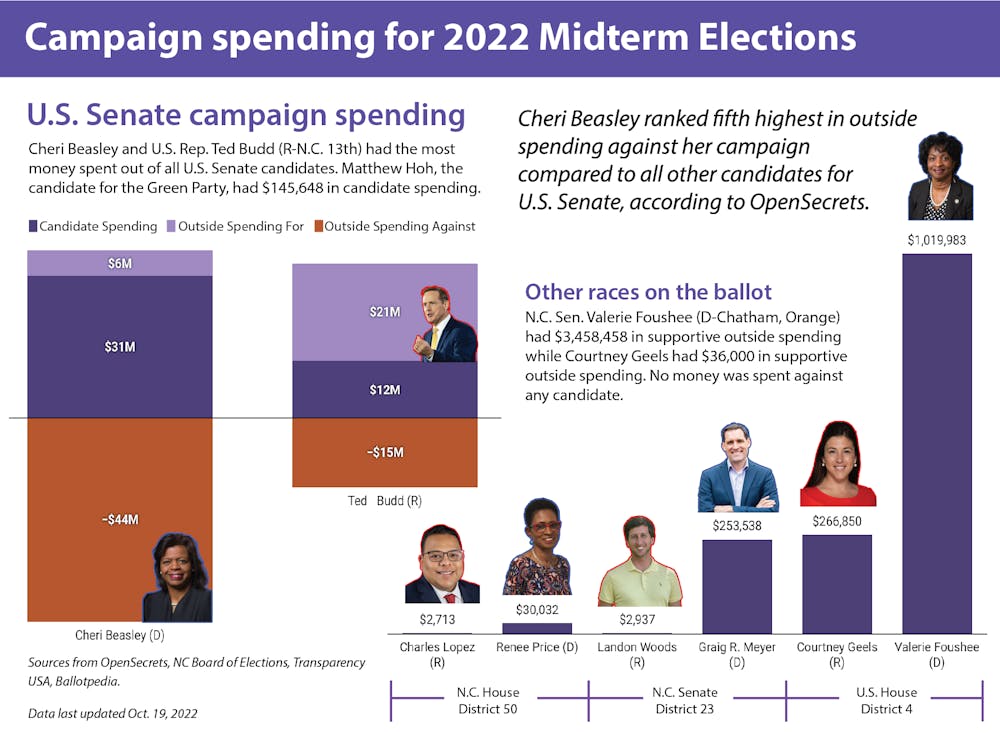“If you were talking to somebody who came out of the Democratic Party or the Republican Party, you're going to be having a very different conversation than you're going to have with a campaign manager for a Green campaign,” she said. “So for us, fundraising is the lifeblood of being able to run anything.”
Roby said Hoh’s campaign spent at least $30,000 for the ballot access effort, and other expenses included campaign staff salaries, account subscriptions and a small merchandise store. She added that the campaign’s biggest spending on advertising has been to boost ads on Facebook.
There was no data available for Libertarian U.S. Senate candidate Shannon Bray's campaign spending.
N.C. Sen. Valerie Foushee (D-Chatham, Orange), the Democratic candidate for U.S. House District 4, has raised $1,190,431 and spent $1,019,983.
Republican candidate Courtney Geels has raised $359,613 and spent $266,850.
State races
N.C. House District 50 Democratic candidate Renée Price spent $30,032 this election cycle. The Republican candidate for N.C. House District 50, Charles Lopez, spent $2,713.
“For a candidate for House, one of the best ways to fundraise is to have a candidate make direct calls to voters,” Cathy Chapman, campaign manager for Price, said. “But as far as the events, I think events help you with getting more excitement and getting volunteers involved.”
Chapman said the benefit of campaign fundraising is that it allows campaigns to print postcards, mailers and have a professional website. She said the actions would not be possible with only volunteer help.
Chapman said for the general midterm election, Price’s campaign has sent mail to 20,000 people, which cost over $13,000.
“People don’t realize when they get that simple mailer that’s not in an envelope, that when you’re mailing to thousands of people, you don’t get any breaks from the post office,” she said.
Chapman said campaigns need to spend more on mailers and digital advertising. She said she would personally like to return to increased door-to-door campaigning and spend less on digital and radio ads and mailers.
To get the day's news and headlines in your inbox each morning, sign up for our email newsletters.
She said door-to-door fundraising is effective in helping community members get out and vote because people pay attention to their friends, neighbors and local groups.
N.C. Rep. Graig Meyer (D-Caswell, Orange), N.C. Senate District 23 Democratic candidate, spent $253,538 this election cycle.
Republican candidate Landon Woods has spent $2,937.
Outside spending
Suzanne Globetti, a UNC teaching associate professor of political science, said campaigns are moving away from local news ads and putting more money into streaming services.
She added that the Citizens United vs. FEC court case in 2010 opened up campaign funding, and allows any person or business with a lot of money to contribute as much as they want to campaigns.
Globetti said one type of outside spending group is a super political action committee.
“Essentially those organizations can raise money in unlimited sums from people and can spend it in unlimited sums, but they do have to disclose who is giving the money and what they’re spending it on,” she said.
Super PACs are not allowed to coordinate with the actual candidate’s committee. Globetti said particularly nasty or controversial ads often come from an outside group.
For the North Carolina US Senate race, outside spenders have given $44.1 million to oppose Beasley and $15 million to oppose Budd.
Beasley received $5.6 million in supportive outside spending and Budd received $21.1 million.
“As much money as there is, as many ads as there are, we haven’t really found a very strong link, actually,” Globetti said. “Ads are not thought to be very effective during campaigns."
She said political scientists think the economy, the popularity of the candidate and the partisan swing in a district or state all predict elections much more than candidate spending.
@Lucymarques_
@DTHCityState | city@dailytarheel.com
Lucy MarquesLucy Marques is a 2023-24 assistant city & state editor at The Daily Tar Heel. She was previously a city & state senior writer. Lucy is a junior pursuing a double major in political science and Hispanic literatures and cultures.




